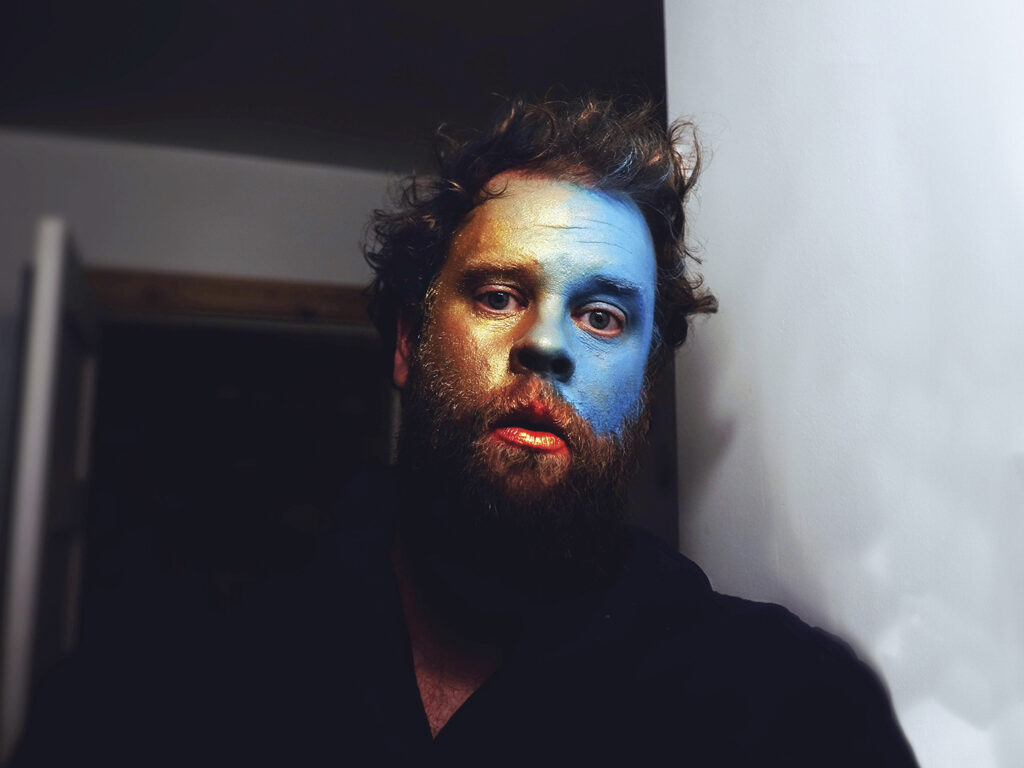Jeffrey Martin – Thank God We Left The Garden

Thank God We Left The Garden so often sounds like something you might have heard for the first time in an early-’70s bedsit, you’re tempted to rewrite Jeffrey Martin‘s life. In an alternative biography, he arrives in New York during the late-’60s singer-songwriter boom, playing the same Greenwich Village rooms Dylan set on fire a few years earlier. He signs to Elektra, moves to LA. A debut album is universally acclaimed but sells modestly. Elektra drop him when a second album doesn’t sell at all. He’s recently become friends with Judee Sill, who introduces him to heroin and David Geffen. He sinks everything he’s got into an album, just voice and guitar, banking on a deal with Geffen’s Asylum label that doesn’t happen because by now he’s a barely functioning junkie. He disappears from the scene, the album tapes lost until they’re rediscovered 50 years later and released on Tompkins Square, Martin finally getting the recognition he was denied in a long-gone era, a happy ending to a blighted career. It’s the stuff of deserved legend.
ORDER NOW: Sly Stone is on the cover of the latest UNCUT
Thank God We Left The Garden, however, was actually recorded last year and Martin is a 37-year-old former high-school English teacher, originally from San Antonio, resident for many years in Portland, Oregon, who only gave up the classroom for a full-time music career in 2016. He’s recorded three previous albums, Gold In The Water (2009), Dogs In The Daylight (2014) and One Go Around (2017). Key songs across all three albums might have first taken shape as short stories – usually hard luck tales of broken lives. Death and bad weather featured regularly. You would not have mistaken any of them for outtakes from an ELO boxset. The instrumentation was minimal, monochromatic. Voice, guitar, gorgeously sad fiddle, occasional piano and drums. When a trumpet pops up on the title track of Dogs In The Daylight, it’s a shock, like the session’s been taken over by Kool & The Gang.
This album is starker yet, 11 songs recorded in Martin’s garden shed, originally as demos, his wonderfully expressive voice and guitar occasionally embellished by co-producer Jon Neufeld’s crepuscular electric guitar, but more usually unadorned. It’s Martin’s most mesmerising, brilliant album, the confidential intimacy and allusive poetry of songs like “Paper Crown” and “Quiet Man” keenly recalling the ecstatic hum of Paul Siebel’s 1970 classic Woodsmoke And Oranges.
The titular garden Martin is glad to have left, referenced in several songs, is no paradise lost. In the album’s cosmology, Eden is more a honeyed holding cell, God the man with the handcuffs, the so-called Fall more jailbreak than shameful exile. Outside the garden, of course, the world is cruel and unforgiving. You’re out there on your own, pal, like the lost dog of the album’s opening track. Better, however, in Martin’s opinion, to live beneath overcast skies of existential dread than the holy blue skies of a risible utopia.
The album is sometimes reminiscent of Bob Carpenter’s Silent Passage, coincidentally a genuinely lost country rock classic from 1974, unreleased then and not widely heard until 2014. Carpenter’s record was partly a hymn to the survivors of the late-’60s hippie Diaspora, the crumbling counterculture, its membership adrift in the inclement ’70s, no-one to depend on but themselves. Martin in these songs could be one of them. There’s much searching for meaning, purpose, truth. Sadness is part of it all, something else to be endured. “I miss your breath on my shoulder, miss your breath on my shoulder,” runs the chorus of “Sculptor”, an astonishingly beautiful song about bereavement, loss, memory. There is much regret. “Red Station Wagon” is about betrayal, a gay friend in crisis turned away, painfully candid. Martin previously might have overwritten the narrator’s guilt. Here it’s reduced to the anguished admission, “I can’t believe I let you down.”
Few of the songs offer solace, qualified or otherwise. Mostly, there is fatalism, the kind you associate with Townes Van Zandt. “I’ll be dead in a moment, just a breath and I’ll be gone,” he sings on “Lost Dog”. He finds a liberating calm in the knowledge things will go on without him. “The world will spin and the sun will go on burnin’, never knowin’ I was alive,” he almost whispers on the exquisitely pretty “There Is A Treasure”, sounding like a man who’s found somewhere he can at last rest in peace, or something like it, death the sweetest amnesty. A masterpiece in any time zone.
Link to the source article – https://www.uncut.co.uk/reviews/jeffrey-martin-thank-god-we-left-the-garden-144205/
Recommended for you
-
Roland JD-800 – Large original WAVE/Kontakt Multi-Layer Samples/loops Studio Library
$14,99 Buy From Amazon -
RIVEN Cambium Elk Bugle Tube for Elk Hunting | Premium Bull Elk Call for Bugling, Chuckling, Locating, Raking & More | Includes Adjustable 550 Paracord Sling (Black Walnut)
$329,99 Buy From Amazon -
AnNafi® Bugle | Brand New Tuneable Army Military Bugle Nickel Plated With Free Hard Case + M/P |US Military Cavalry Horn Boy Scout Bugle |Musical Instrument & Home Classic Style Retro Horn Bugle
$89,98 Buy From Amazon -
1Pcs Yootones Metal Single Leg Banjo Armrest Protector Part Compatible with Banjo Accessory (Silver)
$9,95 Buy From Amazon -
Ibanez SR300E SR Standard – Iron Pewter
$349,99 Buy From Amazon -
61 Key Portable Electronic Keyboard Piano w/Lighted Full Size Keys, LCD, Headphones, X-Stand, Stool, Music Rest, Microphone, Note Stickers, Built-In Speakers,3 Teaching Modes
$159,99 Buy From Amazon -
Yamaha Standard Bb Cornet YCR2330II
$279,00 Buy From Amazon













Responses